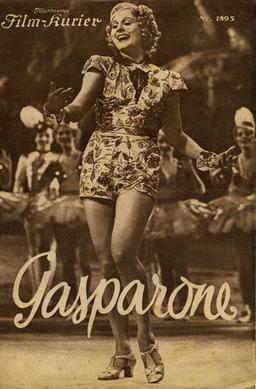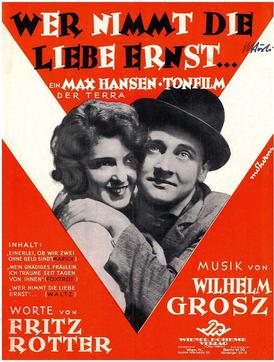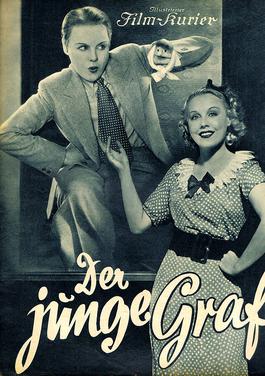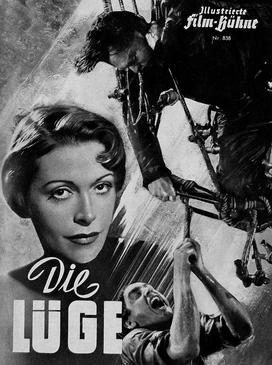
Gasparone is a 1937 German musical comedy film directed by Georg Jacoby and starring Marika Rökk, Johannes Heesters and Heinz Schorlemmer. It is based on the operetta Gasparone by Carl Millöcker with a libretto by F Zell and Richard Genée. It was shot at the Babelsberg Studios and on location in Croatia. The film's sets were designed by the art director Erich Kettelhut. It premiered at the Ufa-Palast am Zoo in Berlin.

A Student's Song of Heidelberg is a 1930 German musical film directed by Karl Hartl and starring Hans Brausewetter, Betty Bird and Willi Forst. It marked Hartl's directoral debut. The film is in the tradition of the nostalgic Old Heidelberg.

Trouble Backstairs is a 1935 German romantic comedy film directed by Veit Harlan and starring Henny Porten, Else Elster and Rotraut Richter. It marked the directoral debut of Harlan, who had previously worked as an actor, and quickly developed as a leading director of Nazi Germany. It was based on a play by Maximilian Böttcher, and was remade in 1949.

Who Takes Love Seriously? is a 1931 German romantic comedy film directed by Erich Engel and starring Max Hansen, Jenny Jugo, and Otto Wallburg. It was shot at the Marienfelde Studios of Terra Film in Berlin and on location in the city. The film's sets were designed by the art director Heinrich Richter.

The Young Count is a 1935 Czech-German comedy film directed by Carl Lamac and starring Anny Ondra, Hans Söhnker and Fritz Odemar. It is set around the circus, part of a subgenre of Circus films. It was shot at the Tempelhof Studios in Berlin. The film's sets were designed by the art directors Wilhelm Depenau and Erich Zander.

Maria the Maid is a 1936 German drama film directed by Veit Harlan and starring Hilde Körber, Hilde Hildebrand, and Alfred Abel. It is based upon Die Kindsmagd, a novella by Walter Harlan. It was shot at the Johannisthal Studios in Berlin. The film's sets were designed by the art directors Erich Grave and Hans Minzloff.

Paul and Pauline is a 1936 German comedy film directed by Heinz Paul and starring Ludwig Manfred Lommel, Trude Hesterberg and Erika Helmke. It was shot at the Terra Studios in Marienfelde in Berlin.

The Cheeky Devil is a 1932 German comedy film directed by Carl Boese and Heinz Hille and starring Willy Fritsch, Camilla Horn and Ralph Arthur Roberts. It was shot at the Babelsberg Studios in Berlin and premiered in the city's Gloria-Palast. The film's sets were designed by the art directors Willi A. Herrmann and Herbert Lippschitz. A separate French-language version You Will Be My Wife was also released.

Two Good Comrades is a 1933 German war comedy film directed by Max Obal and starring Paul Hörbiger, Fritz Kampers, and Jessie Vihrog.

Inge and the Millions is a 1933 German comedy film directed by Erich Engel and starring Brigitte Helm, Carl Esmond, and Paul Wegener. Produced by UFA, it was shot at the Babelsberg Studios in Potsdam. The film's sets were designed by Otto Erdmann and Hans Sohnle. Location filming took place in Berlin and around Lake Constance.
The World Wants To Be Deceived is a 1926 German silent film directed by Peter Paul Felner and starring Harry Liedtke, Georg Alexander and Mady Christians.
Marriage in Name Only is a 1930 German drama film directed by Heinz Paul and starring Evelyn Holt, Erika Dannhoff, and Wolfgang Zilzer.

Modern Dowry is a 1932 German comedy film directed by E. W. Emo and starring Mártha Eggerth, Georg Alexander, and Leo Slezak. It was shot at the Johannisthal Studios in Berlin. The film's sets were designed by the art director Otto Hunte.

Mrs. Lehmann's Daughters is a 1932 German comedy film directed by Carl Heinz Wolff and starring Hansi Niese, Hertha Thiele, and Else Elster. It was shot at the Terra Studios in Berlin. It is a remake of the 1925 silent film Three Waiting Maids. A Swedish remake Marriageable Daughters was produced the following year.

The Lie is a 1950 West German crime film directed by Gustav Fröhlich and starring Otto Gebühr, Sybille Schmitz and Cornell Borchers. It was shot at the Bendestorf Studios. Location shooting took place around Hamburg and Westerland. The film's sets were designed by the art director Franz Schroedter.

Holiday From Myself is a 1934 German comedy film directed by Hans Deppe and starring Hermann Speelmans, Carola Höhn, and Georg H. Schnell.

She and the Three is a 1935 German comedy crime film directed by Victor Janson and starring Gustav Waldau, Charlotte Susa and Hubert von Meyerinck.

The Tiger Murder Case is a 1930 German mystery film directed by Johannes Meyer and starring Charlotte Susa, Harry Frank and Hertha von Walther. It was shot at the Babelsberg Studios in Berlin. The film's sets were designed by the art director Willi Herrmann.

Love and the First Railway is a 1934 German historical comedy film directed by Robert Neppach and starring Jakob Tiedtke, Ida Wüst, and Karin Hardt. The plot revolves around the construction of the railway line between Berlin and Potsdam in the 1830s, the first in the Kingdom of Prussia.

Capers is a 1937 German comedy film directed by and starring Gustaf Gründgens and also featuring Marianne Hoppe, Fita Benkhoff and Volker von Collande. It was shot at the Johannisthal Studios in Berlin. The film's sets were designed by the art directors Kurt Herlth and Werner Schlichting. It was produced and released by Terra Film while international distribution was handled by Tobis Film.


















